Best survey tool of 2025
Find out what your customers need

We list the best survey tools, to make it simple and easy to find out what your customers want and need.
There are always ways to improve your business products or services, but knowing how and in what way can be difficult to know. Choices that may seem intuitive within the business can seem alien and off-putting to customers, so it's important to ensure any significant changes are tested first.
While it's easy to imagine that customers want the lowest price over every over consideration, more likely they will pay more for a better experience - a key mantra of Apple.
There may also be better ways in which to handle customers or learn further interests to potentially cross-sell into. All of which is moot if you don't have a way to properly gauge and measure what customers want.
In her research paper, Winona State University's Julie Ponto outlines the important role surveys can play in information gathering. "Survey research is a useful and legitimate approach to research that has clear benefits in helping to describe and explore variables and constructs of interest," she says. "Survey research, like all research, has the potential for a variety of sources of error, but several strategies exist to reduce the potential for error." One strategy concerns choosing the right survey tool.
Analytics can provide working data on the customer journey, which can be essential for providing business insights, but even then the data must be interpreted and customer intentions presumed, so it's always best to try and hear back from the customer directly.
Forms and survey tools are one way in which to do this, and while some of the best CRM software may have feedback options built into them, they aren't always configurable or contain bias that makes it difficult for a customer to provide the feedback they want to give. Similar applies with simple email questionnaires.
Forms allow you to better configure and analyze responses, without having to make the experience so complicated as to put off users giving their feedback.
Here then, are the best survey tools, to allow you to reach out to your customers and improve your understanding not just of what they want, but how to deliver a better business experience to them.
Reader offer: Make surveys with Jotform Enterprise
Create surveys easily with Jotform Enterprise whether you're conducting market research or measuring employee satisfaction. Create your own survey with Jotform's drag-and-drop builder or choose from 800+ survey templates. Send email invitations, create a shareable link, or embed it on your website. Create professional-looking reports to analyze data and make informed business decisions.
Preferred partner (What does this mean?)
We've also highlighted the best business intelligence tools.
The best survey tools of 2025 in full:
Why you can trust TechRadar
Best survey tool overall
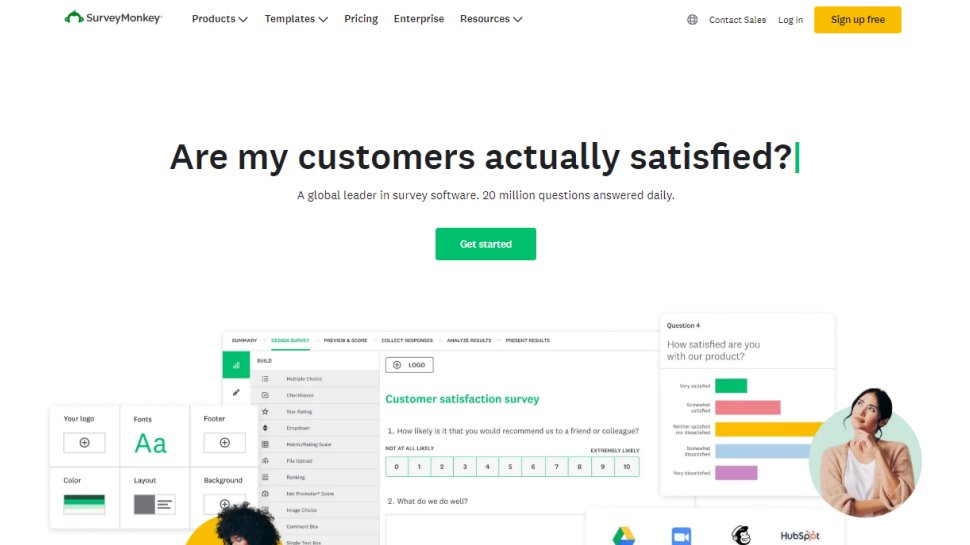
Reasons to buy
Reasons to avoid
One of the most successful survey solutions around with over 40 million registered customers, SurveyMonkey offers a comprehensive questionnaire building solution and metric analysis tools.
It allows those without any coding skills to create complex question sets and then process the responses easily and efficiently.
You can sign up for free and create a survey within minutes. However, you can’t access the data collected in CSV or Excel XLS until you’ve signed up for a paid option. And the price goes up more if you expect more than 1000 responses per month or want to use any of the sophisticated branching and pipeline features.
A number of pricing tiers are available, with Team Advantage being the cheapest. This allows control over survey sharing, team analysis, shared asset library, custom graphics, as well as easy data exporting.
The next tier, Team Premier, adds features such as benchmarks, industry tools, and multilingual surveys. The Enterprise plan offers extra security and compliance features, as well as admin management and migration as required.
Read our full SurveyMonkey review.
Best survey tool for flexibility
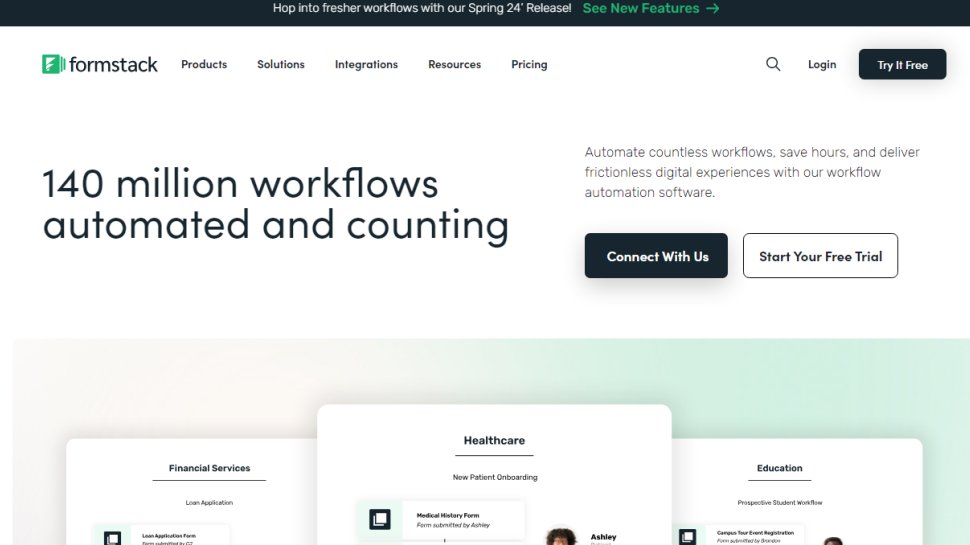
Reasons to buy
Reasons to avoid
Formstack is a good example of a survey product with a very wide remit. The online form tool allows the creation of sophisticated surveys and their responses to be data harvested. But it can also be used for straightforward customer feedback panels on websites and social media.
Many companies use it to process leads and analyze their rate of conversion by integrating it into other sales management solutions. It works with MailChimp to enable targeted information gathering and feedback from existing customer databases.
As a survey tool, it works well enough, though it doesn’t have the templates that some competitor products offer.
Costing has four levels; Bronze, Silver, Gold and Platinum. The Bronze package offers a single user solution with basic forms and no application integration. At the other end of this scale, the Platinum plan has a multi-user license with the scope for multiple forms and thousands of submissions per month.
Read our full Formstack review.
Best survey tool for interaction
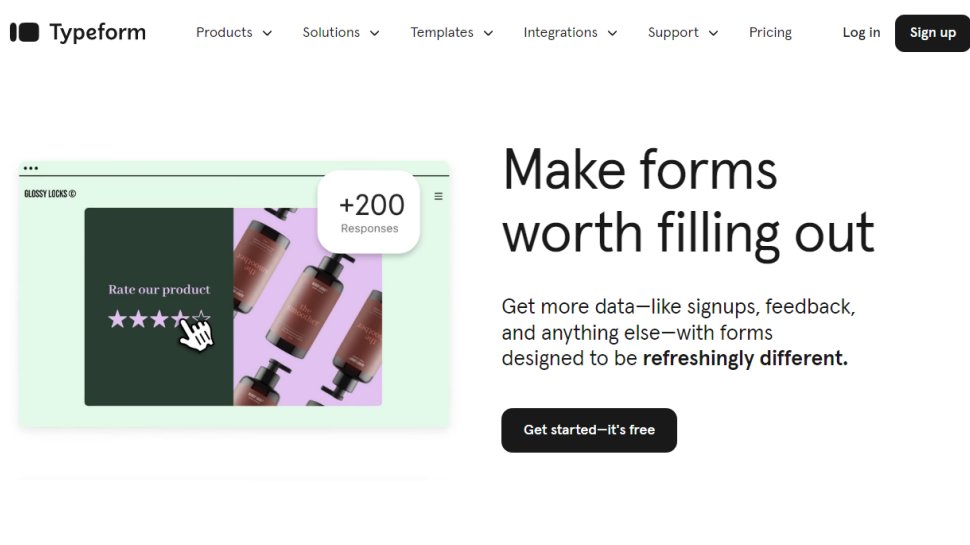
Reasons to buy
Where other survey tools focus on how complicated a questionnaire can be, or how much data you can extract, Typeform takes a wholly different approach.
Its focus is user interaction, believing that the way to get the best responses is to engage the end user and through that get better responses. The Typeform methodology appears to work well, getting on average four times the completion rate over what the industry considers standard.
Service begins with the Essentials package, which offers a basic range of features. Upgrade to the Professional plan and not only do you get up to 5,000 responses but also unlimited logic jumps as well as conversion tracking and HubSpot integration. However, if paid yearly the Professional plan is discounted.
Each of these is restricted to a single user, though Enterprise deals are available.
Read our full Typeform review.
Best survey tool for ease of use
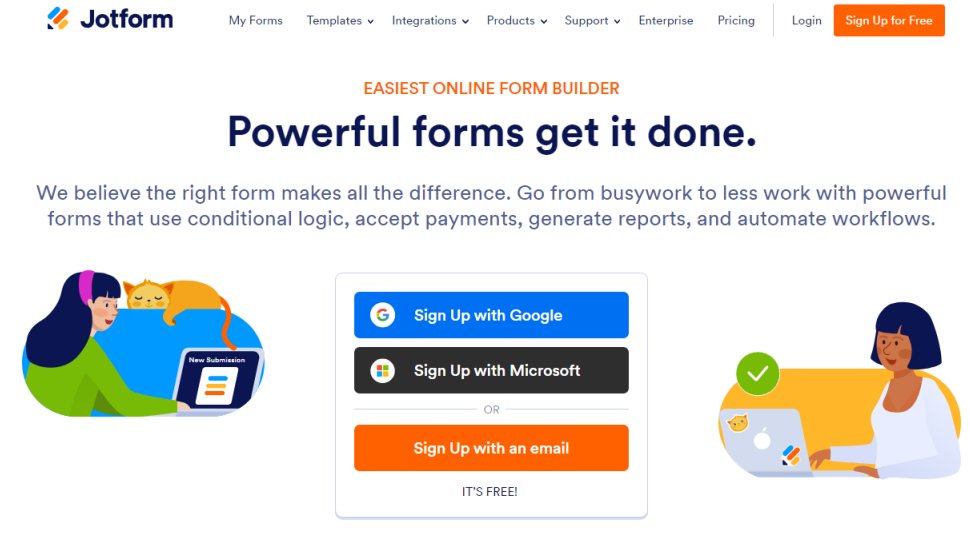
Reasons to buy
Reasons to avoid
JotForm is an online web and email survey building solution that aims to undercut Typeform while being even easier to use.
A coding-free solution that most marketing people should be able to master quickly and generate the leads or feedback that they need.
In the past 12 years, JotForm has built a customer base of 2 million regular customers, creating forms in 177 countries and 12 languages.
A Start plan is free to use, and offers up to 100 submissions, 100MB of online storage, as well as 5 forms and 1,000 form views. Paid plans - when paid yearly - start with the Bronze and increases monthly submissions to 1,000, and as well as cloud storage space to 1GB, as well as 25 forms and 10,000 views.
The Silver plan introduces HPIAA compliance as well as increasing views to 10,000, storage to 10GB, up to 100 forms, and unlimited views. The Gold plan increases submissions to 100,000, 100GB of storage, and unlimited forms and views.
Read our full JotForm review.
Best survey tool for NPS
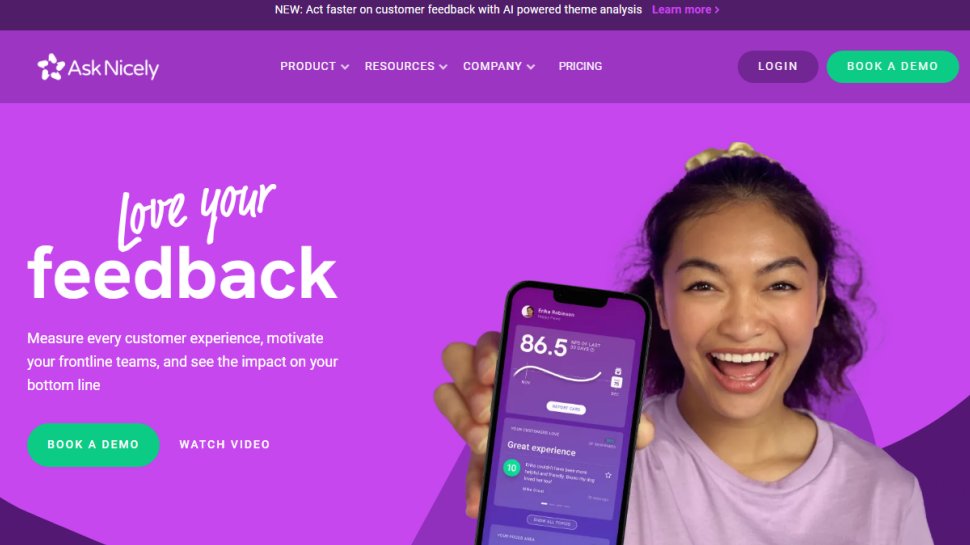
Reasons to buy
Reasons to avoid
AskNicely’s unique selling point is that it can collect live information based on the Net Promoter Score (NPS). NPS is an excellent way to gauge the strength of customer relationships for a business, and this tool was designed to track that dynamic.
It also integrates with many customer workflow options that include Salesforce, Hubspot, Slack, Zendesk, MailChimp and Zapier amongst many others.
With these connections, surveys can target specific customer groups, and their reaction to new products and services can be collected to present real-time to live dashboards.
AskNicely used to advertise plans that were expensive but packed with features - however, the website no longer displays pricing information and instead asks for potential customers to contact them directly for a quote.
Read our full AskNicely review.
Best basic survey tool
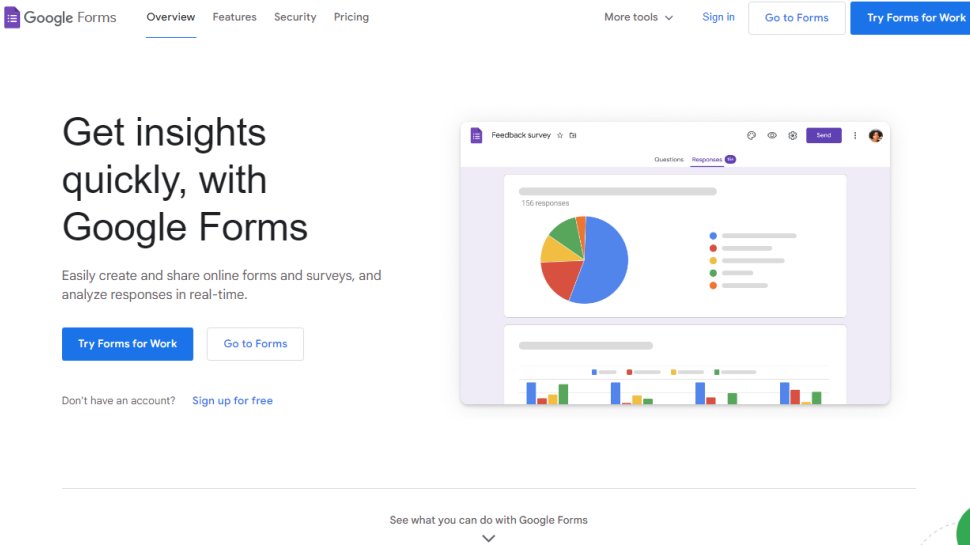
Reasons to buy
Reasons to avoid
Many business people don’t need anything exotic or complicated. Maybe a simple form to ask their customers if they enjoyed the last seminar and how to make it better is sufficient.
For them, the free to use Google Forms is a perfectly adequate tool that requires little skill or experience to use, and is available for free as a personal edition or as part of the G Suite for business platform.
Responses are stored automatically into Google Sheets, allowing them to be easily transferred to an Excel spreadsheet or a database later.
The key weakness of Google Forms is that unless recipients have a Google Account and are willing to log in with it, they can fill out a survey multiple times.
As it is free before you spend big, it might be worth seeing if it will do enough, or at least hint what bought product features you might want.
Read our full Google Forms review.
Honorable mentions
Online survey can be hugely useful tools for gathering important information, which is why so many vendors have a version of their own to offer businesses. Although we've highlighted what we see as the best of the best above, there are other options that we feel might be worthy of your consideration. Here they are:
- SurveySparrow: With the free version of SurveySparrow allowing you to create three active surveys, users can explore many of the features on offer here without paying a penny. These features include the ability to share their surveys via web link, email, Slack, and Microsoft Teams.
- Zoho Forms: Part of the Zoho family, which includes an extensive suite of tools, Zoho Forms forms benefits from offering users close integration with those other tools. In terms of payment, the Standard plan allows for unlimited forms for 10 users with 25,000 submissions per month at a cost of $10 per month.
- SoGoSurvey: Boasting a user-friendly interface and a number of different question types, SoGoSurvey is a decent survey tool. It comes with a generous free plan too.
We've listed the best online form builders.
Best survey tool FAQs
Which is the best survey tool for you?
| Row 0 - Cell 0 | Templates | Pricing | Other features |
SurveyMonkey | 250+ | From $25 a month | Shared asset library, custom graphics, benchmarks, industry tools, and multilingual surveys |
Typeform | 3,000+ | From $25 a month | Drag and drop template design, hidden fields, encryption, data export |
JotForm | 7,500+ | Free plan offered | Drag and drop template design, autoresponder emails, offline forms, electronic signatures |
AskNicely | For NPS surveys, CSAT surveys, customer service satisfaction surveys, etc | $449 per month for unlimited users | In app surveys, white label surveys, unlimited API data extraction, team huddles |
Google Forms | 17 with free plan | Free | Theme customization, analytics, data export |
Formstack | 100+ web form templates and 30+ document templates | $83 a month | AI form builder, smart lists, conditional logic |
Choosing an online survey tool
Rasto Ivanic, co-founder and CEO at GroupSolver
A major difference between traditional market research platforms and the latest generation of online surveys is the amount of information they can extract from open-ended questions and unstructured language data. Such data is critical for capturing the kinds of free-flowing thoughts from the respondent that yield the most relevant customer insights. Online surveys that use artificial intelligence (AI) and natural language processing (NLP) have streamlined delivery of these kinds of high-value insights and make them available immediately, without any post-processing or further data manipulation.
Historically, to hear the voice of customer at scale, researchers have asked closed-ended multiple-choice questions in surveys rather than open-ended ones. The former is easier to tabulate than having to read and organize free-text answers, but it dramatically reduces the depth of the resulting data. As an example, a streaming music service wanted to understand consumer behavior but could only glean minimal information by using traditional close-ended survey approach. Only when the company converted the survey to open-ended questions about why respondents listened to music could it start describing their customers in more meaningful behavioral and attitudinal terms ranging from the deeply spiritual (“I connect with God through music”) to the practical and behavioral (“Music allows me to focus while I’m working”).
Without AI technology, projects like this music survey with 10,000 participants might require days of manual data review, cleaning and organizing and still come up short on insights. In contrast, the next generation online surveys use AI and NLP to automatically perform a first-pass clean-up of text answers, in real time. Some platforms even use respondents’ collective intelligence to further validate and classify language data by interacting with it while it is being collected. Within a few minutes, researchers have a treasure trove of unfiltered and organic sentiments in respondents’ own voice, and in real-time.
An important added benefit of such a gamified interactive process is that respondents enjoy it more. More engaged and attentive respondents in turn result in higher-quality responses. Furthermore, the statistically validated qualitative data can be used in quantitative models, such as net promoter score (NPS), segmentation, or pricing studies, where natural text data can now become categorical variables in quantitative models.
The combination of AI and NLP technologies that smartly integrate into online surveys is making lasting inroads into the traditional market research toolkit. They are moving the insights industry toward free-flowing natural conversations with respondents, at speed and at scale. This is creating an opportunity for researchers to integrate unstructured customer data more directly into insights and statistical models that support them.
Which survey tool is best for you?
When deciding which survey tool to download and use, first consider what your actual needs are, as sometimes free platforms may only provide basic options, so if you need to use advanced tools you may find a paid platform is much more worthwhile. Additionally, higher-end software can really cater for every need, so do ensure you have a good idea of which features you think you may require in your surveys.
How we tested the best survey tool
To test for the best survey tools we first set up an account with the relevant platform, then tested the service to see how our surveys could be used for different purposes and in different situations. The aim was to push each survey platform to see how useful its basic tools were and also how easy it was to get to grips with any more advanced tools.
Read how we test, rate, and review products on TechRadar.
We've also featured the best customer experience tools.
Get in touch
- Want to find out about commercial or marketing opportunities? Click here
- Out of date info, errors, complaints or broken links? Give us a nudge
- Got a suggestion for a product or service provider? Message us directly
- You've reached the end of the page. Jump back up to the top ^
Are you a pro? Subscribe to our newsletter
Sign up to the TechRadar Pro newsletter to get all the top news, opinion, features and guidance your business needs to succeed!
Mark is an expert on 3D printers, drones and phones. He also covers storage, including SSDs, NAS drives and portable hard drives. He started writing in 1986 and has contributed to MicroMart, PC Format, 3D World, among others.

